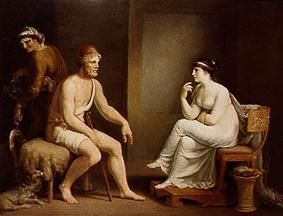

What Molly has woven by day is an affair with Blazes. Within her mind, Molly, like her archetype Penelope, unweaves at night what she has woven by day. To use the metaphor that Stephen uses for Shakespeare, Molly's imagination turns everything into grist for her mill. Her stream of consciousness becomes the ultimate metaphor for the energy that makes intellectual, spiritual, and artistic growth possible. The constant motion and energy of Molly's prose enact the triumph of the quote, "stream of life", unquote.

Namely, that life with all its frustrations, incomprehensibility, quirks, and contradictions must take precedence over the categorizing sensibility of both Bloom and Stephen. Molly's nominalistic, idiosyncratic narrative confirms the values of the novel. Joyce felt that only under the profound influence of Nora Barnacle could he have made the word flesh. That she accedes to his assertive request indicates that the characteristic pattern of uxurious submission will be reversed on June 17, 1904. The episode begins with Molly's exceeding to Bloom's request to get him breakfast the next day. Her monologue is a lyrical explosion that comments on the prior intellectuality of the novel. On the other hand, she is important to the metaphorical and formal patterns of the novel, and helps expand the novel to include an unselfconscious perspective that is an alternative to Stephen's- and at times, Bloom's- Hamletizing. On one hand, Molly is a bawdy, sexually alive, uneducated woman, intent on her own pleasure, and appreciative of her husband's qualities. Molly is the goal of Bloom's Odyssean quest to return home, and an important example of Stephen's quest for mature sexuality to complete himself. SCHWARZ: Let us turn briefly to the final episode, in which Joyce presents Molly's wonderful soliloquy.


 0 kommentar(er)
0 kommentar(er)
